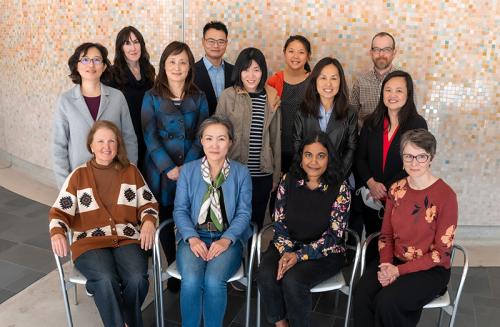The HDFCCC Biostatistics & Population Research Core is a shared resource providing statistical expertise and collaboration to Cancer Center investigators on all phases of basic science, translational, clinical, epidemiological, and prevention research.
Mission
The mission of the Core is to ensure rigorous and efficient planning, conduct, and reporting of research using best practices in biostatistics and population sciences, and to advance research methodologies via education and innovation.
Core Members
- Mi-Ok Kim, PhD
Director - Salma Shariff-Marco, PhD, MPH
Co-Director - Iona Cheng, PhD, MPH
- Aly Cortella, MPH
- Mindy DeRouen, PhD, MPH
- Christine Duffy
- Jean Feng, PhD
- Scarlett Lin Gomez, PhD, MPH
- Joan F. Hilton, ScD, MPH
- Chiung-Yu Huang, PhD
- Yunxiang Huang, PhD
- Fei Jiang, PhD, MS
- Ann Lazar, PhD, MS
- Meg McKinley, MPH
- Dan Meltzer, MPH, MA
- Alan Paciorek, BS
- Hai Yang, MS
- Li Zhang, PhD

Key Services
We support development and review of protocols, grant applications, and other collaborations by providing statistical and population science expertise in the following areas:
Study Design
Providing statistical and population science expertise on overall study design considerations including formulation of research questions and hypotheses, selection of appropriate data resources, sampling scheme, and endpoints. Biostatistical expertise includes sample size and power computation, statistical analysis planning, and randomization. Population science expertise includes population-level cancer research including analyses and interpretation of cancer registry and population-level linked datasets (e.g., cancer registry data linked to claims, EHR, hospital discharge data); neighborhood research (e.g., analyses of geospatial data, mapping); and data visualization (e.g., interactive mapping portals, interactive data query portals). Expertise on adaptive trial design is also available.
Study Implementation
Providing statistical and population science expertise regarding randomization, questionnaire design, variable definition, database structure, interim analysis, resolution of statistical questions as they arise during ongoing studies, and data safety monitoring (through participation in the Data Monitoring Committee).
Data Analysis and Study Results Reporting
Conducting or supervising data analyses, and assisting with interpretation and reporting study results.
Teaching
Offering formal courses through the Department of Epidemiology and Biostatistics and informal lectures via individual presentations. Topics available for informal lectures include:
- Statistical issues in the design/conduct of clinical trials & observational studies
(e.g. sample size/power determination, interim analyses, and study monitoring) - Multiple hypothesis testing
- Adaptive/group sequential trial designs
- Social determinants of health / health disparities
- Cancer epidemiology
- Cancer surveillance
- Integrative data analyses and data linkages
Collaborative Process
All projects are subject to a triage/prioritization procedure. Details of the procedure are provided below under the Core’s policy on Priorities and Utilization Limits. In order to best serve HDFCCC members and their research, and to properly allocate resources, we strongly encourage investigators to contact us as early in the planning or data analysis process as possible. We recommend minimum two weeks in advance for brief consultations, two months for any consultation requiring a significant time investment including grant development. Please submit your collaboration request here.
We schedule initial consultation meetings to assess the scope of work and nature of the requested collaboration. After the triage/prioritization process, Core members are assigned to the project based on required area of expertise and level of expertise, disease site committee affiliation, and availability. This may mean that the statistician or population scientist who initially consults on a project may not ultimately end up being the collaborator for that project. All decisions concerning the allocation of the Biostatistics & Population Research Core resources and project assignments are made by the Co-Directors on a case-by-case basis.
Priorities and Utilization Limits
The UCSF HDFCCC Biostatistics & Population Research Core aims to provide cancer researchers as much assistance as possible, particularly new and/or early-career researchers who may not have well established funding sources. Specifically, we prioritize HDFCCC members over non-members and prioritize projects in the following order:
- Funded peer-reviewed studies, peer-reviewed grant applications, investigator-initiated protocols based on discoveries at UCSF
- Investigator-initiated PRC-approved clinical trials, abstracts/manuscripts intended for grant development
- Non-peer-reviewed grants and clinical studies
- Non-funded projects intended for abstracts and manuscripts, non-investigator-initiated industry sponsored trials
We also give a high priority to teaching affiliated medical fellows, residents, and post-docs intent on pursuing research careers. Projects are addressed by the priority order on a time-available basis.
Supported by the Cancer Center grant, the Core collaborates on the development of protocols by Cancer Center members and on trainee’s career development work without requiring additional funding. Development of grant applications that include salary support for Core members are also supported without requiring additional funding. In all other cases, efforts will be made to find alternative funds and/or support, for example, those provided by CTSI.